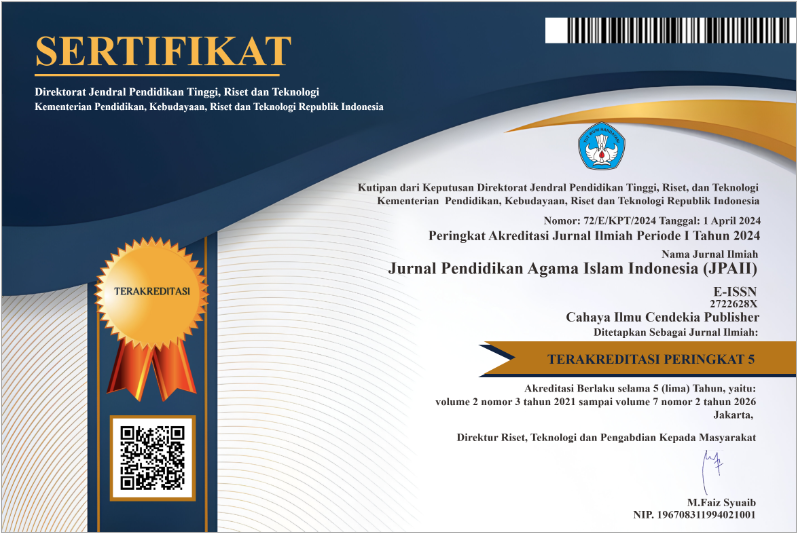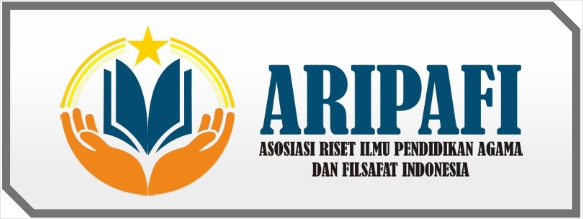Religious Guidance and Character Education for School Dropouts at the Social Rehabilitation Center
Abstract
Purpose of the study: This study aims to determine the implementation of religious guidance at the Social Rehabilitation Center.
Methodology: This study uses a qualitative approach with 12 respondents as research subjects. The interview method is the main method and the documentation method is complementary. The data collection method is carried out using a research instrument in the form of an interview, namely an interview with questions regarding the implementation of religious guidance. While the documentation method is used to determine the location and subject of the study.
Main Findings: The research results obtained show that religious development activities include: recitation (study of Fiqh), mujahadah and al-Qur'an, learning about read and write the Quran, yasinan and tahlil at regular recitation, tadarus Al-Qur'an. The methods used in implementing coaching are: lecture, question and answer, habituation and example methods and every time coaching is completed, the coach always conducts an evaluation. The aim of implementing religious coaching is so that the beneficiaries are to direct teenagers about the importance of knowledge about religion and have the awareness to carry it out. So that it is useful in this world and in the afterlife.
Novelty/Originality of this study: This study opens up new insights into the importance of integrating religious guidance with character education in restoring the learning spirit and morals of school dropouts at the Social Rehabilitation Center.
References
M. N. Rokhmah, K. K. Ningtyas, M. Ananta, and N. Sa’adah, “Filsafat Pendidikan Keluarga Dalam Pendidikan Islam,” Tsurayya, vol. 2, no. 1, pp. 14–28, 2023. http://jurnal.staimempawah.ac.id/index.php/tsurayya/article/view/31
A. P. Nadila and A. M. F. Alam, “Menelaah Keberhasilan Pendidikan Karakter Di Jepang Untuk Menunjang Program Penguatan Pendidikan Karakter (PPK) Di Indonesia,” JISPENDIORA J. Ilmu Sos. Pendidik. Dan Hum., vol. 3, no. 2, pp. 242–258, 2024. doi: 10.56910/jispendiora.v3i2.1555
J. Chi-Kin Lee, “Children’s spirituality, life and values education: cultural, spiritual and educational perspectives,” International Journal of Children's Spirituality, vol 25, no. 1, pp. 1-8, 2020. doi: 10.1080/1364436X.2020.1790774
D. Narvaez, “Moral education in a time of human ecological devastation,” J. Moral Educ., vol. 50, no. 1, pp. 55–67, 2021. doi: 10.1080/03057240.2020.1781067
J. Dillon and B. Herman, “Environmental education,” in Handbook of research on science education, Routledge, 2023, pp. 717–748. doi: 10.4324/9780367855758-27
M. Tafui, “Peran Orang Tua dalam Membina Moralitas Remaja Putus Sekolah di Kelurahan Fatukbot, Nusa Tenggara Timur,” PENSOS J. Penelit. dan Pengabdi. Pendidik. Sosiol., vol. 1, no. 1, pp. 22–30, 2023. doi: 10.59098/pensos.v1i1.943
I. R. Wati, “Analisis Nilai Moral Dan Budaya Pada Anak Yang Putus Sekolah Di Kelurahan Oeba Kota Kupang,” Pros. Ilmu Pendidik. dan Kegur., vol. 1, pp. 155–166, 2023. https://e-journal.unmuhkupang.ac.id/index.php/pps/article/view/1345
B. K. Amal, T. Rambe, D. Ampera, A. S. Purba, and H. Ridho, “Parents’ perceptions of children’s education and parents’ attitudes towards the education of fishermen’s children,” J. Pendidikan, Sains Sos. dan Agama, vol. 8, no. 1, pp. 85–97, 2022. https://digilib.unimed.ac.id/id/eprint/52391/
D. J. Losen and P. Martinez, “Lost opportunities: How disparate school discipline continues to drive differences in the opportunity to learn,” na, no. na, 2020. https://escholarship.org/content/qt7hm2456z/qt7hm2456z.pdf
A. D. Irawan, “Pengaruh pandemi dalam menciptakan ketimpangan sosial ekonomi antara pejabat negara dan masyarakat,” J. Citizsh. Virtues, vol. 2, no. 1, pp. 251–262, 2022. doi: 10.37640/jcv.v2i1.1184
A. Yassin, “Research Title: Major Causes of Girls’ School Dropout from General Primary Schools and Related Challenges in South Wollo and Oromia Zones in Amahara Region, Ethiopia,” J. Educ. Pract., vol. 11, no. 10, pp. 34–42, 2020. doi: 10.7176/JEP/11-10-03
F. Mahrool, “Analysis of school dropout among secondary school students: case of Sammanthurai Education zone,” Farwis, M.(2020). Anal. Sch. Dropout among Second. Sch. Students Case Sammanthurai Educ. Zo. Int. J. Acad. Multidiscip. Res., vol. 4, no. 12, pp. 79–85, 2020. https://ssrn.com/abstract=3756476
C. Huda, M. Hanief, and D. M. Hakim, “Islamic Religious Education Learning Strategy with Edutainment Insight in Improving Learning Motivation of Student,” Nazhruna J. Pendidik. Islam, vol. 5, no. 2, pp. 787–805, 2022. doi: 10.31538/nzh.v5i2.2247
M. A. Mu’ammar and M. Badri, “Instillation of the value of caring for the environment at elementary students in pamekasan, indonesia,” J. Pedagog. Educ. Sci., vol. 1, no. 02, pp. 108–116, 2022. doi: 10.56741/jpes.v1i02.78
L. D. Adenanthera, I. Nurul, and M. Izza, “Sheltered workshop model on social protection and empowerment of people with disabilities (PwDs) to prepare competitive human resources in the era of the ASEAN economic community,” Int. J. Innov. Creat. Chang., vol. 12, no. 8, 2020. http://repository.unimar-amni.ac.id/id/eprint/2442
W. Mandrysz, “Community-based social economy–social capital and civic participation in social entrepreneurship and community development,” Manag. Dyn. Knowl. Econ., vol. 8, no. 1, pp. 81–93, 2020. https://www.ceeol.com/search/article-detail?id=943796
P. K. Nisa, A. D. Nuraini, and F. Firda, “Pelayanan Sosial Dalam Pembinaan Remaja Putus Sekolah Di Panti Sosial Bina Remaja Taruna Jaya 1,” Khidm. Sos. J. Soc. Work Soc. Serv., vol. 4, no. 1, pp. 39–46, 2023. https://jurnal.umj.ac.id/index.php/khidmatsosial/article/view/18299
M. K. Alam, “A systematic qualitative case study: questions, data collection, NVivo analysis and saturation,” Qual. Res. Organ. Manag. An Int. J., vol. 16, no. 1, pp. 1–31, 2021. doi: 10.1108/QROM-09-2019-1825
M. H. Batubara, D. Herwanis, and S. Safitriana, “An Analysis of Student’s Error in Writing Ability through Descriptive Text of VII Grade of SMP N 4 Takengon,” J. As-Salam, vol. 5, no. 2, pp. 110–119, 2021. doi: 10.37249/assalam.v5i2.276
E. Kang and H.-J. Hwang, “Ethical conducts in qualitative research methodology: Participant observation and interview process,” J. Res. Publ. Ethics, vol. 2, no. 2, pp. 5–10, 2021. doi: 10.15722/jrpe.2.2.202109.5
M. Thelwall and T. Nevill, “Is research with qualitative data more prevalent and impactful now? Interviews, case studies, focus groups and ethnographies,” Libr. Inf. Sci. Res., vol. 43, no. 2, p. 101094, 2021. doi: 10.1016/j.lisr.2021.101094
S. Suyadi, S. Sumaryati, D. Hastuti, and A. D. Saputro, “Early childhood education teachers’ perception of the integration of anti-corruption education into islamic religious education in bawean island Indonesia,” Elem. Educ. Online, vol. 19, no. 3, pp. 1703–1714, 2020. http://eprints.umpo.ac.id/id/eprint/10808
E. Istiyono, B. Kartowagiran, H. Retnawati, H. Cahyo Adi Kistoro, and H. Putranta, “Effective Teachers’ Personality in Strengthening Character Education.,” Int. J. Eval. Res. Educ., vol. 10, no. 2, pp. 512–521, 2021. https://eric.ed.gov/?id=EJ1299226
N. Komariah and I. Nihayah, “Improving the personality character of students through learning Islamic religious education,” At-Tadzkir Islam. Educ. J., vol. 2, no. 1, pp. 65–77, 2023. doi: 10.59373/attadzkir.v2i1.15
Y. Sabri and B. Santoso, “Strategi Membentuk Akhlak Dan Sikap Keagamaan Melalui Pendekatan Pendidikan Moral,” J. Paris Langkis, vol. 5, no. 1, pp. 110–119, 2024. doi: 10.37304/paris.v5i1.15431
Z. C. Kirana and D. D. Haq, “Pembentukan Karakter Religius Santri di Pondok Pesantren Fathul Ulum Kwagean Kediri Melalui Kegiatan Mujahadah,” J. Kependidikan Islam, vol. 12, no. 2, pp. 225–241, 2022. doi: 10.15642/jkpi.2022.12.2.225-241
S. Salmah, M. M. Maslahat, R. Cahyandari, P. Lusiana, and I. N. Iffah, “The Values of Religious Moderation in the Al-Qur’an Hadith Textbook and Its Implications for the Psychological Dynamics of Students,” in International Prophetic Conference (SWAN) FPQS USIM, 2022, pp. 516–539. https://swanfpqs.usim.edu.my/index.php/conference/article/view/53
E. H. Tyas, S. Sunarto, and L. Naibaho, “Building superior human resources through character education,” TEST Eng. Manag., vol. 83, pp. 11864–11873, 2020. http://repository.uki.ac.id/id/eprint/2871
A. Rohaeni, I. Wasliman, D. Rostini, and Y. Iriantara, “Management of Noble Moral Education for Madrasah Aliyah Students at Persatuan Islam Boarding School,” J. Ind. Eng. Manag. Res., vol. 2, no. 4, pp. 154–171, 2021. doi: 10.7777/jiemar.v2i4.174
A. L. Hakim, “Role of character education in national character building: A retrospection noble values of muslim religiosity,” AL-WIJDÃN J. Islam. Educ. Stud., vol. 8, no. 1, pp. 161–182, 2023. doi: 10.58788/alwijdn.v8i1.1735
Copyright (c) 2024 Basyiroh Basyiroh

This work is licensed under a Creative Commons Attribution 4.0 International License.
Authors who publish with this journal agree to the following terms:
- Authors retain copyright and acknowledge that the Jurnal Pendidikan Agama Islam Indonesia (JPAII) is the first publisher licensed under a Creative Commons Attribution 4.0 International License.
- Authors are able to enter into separate, additional contractual arrangements for the non-exclusive distribution of the journal's published version of the work (e.g., post it to an institutional repository or publish it in a book), with an acknowledgment of its initial publication in this journal.
- Authors are permitted and encouraged to post their work online (e.g., in institutional repositories or on their website) prior to and during the submission process, as it can lead to productive exchanges and earlier and greater citation of published work.







.png)
.png)





















